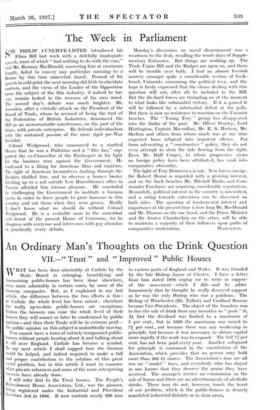The Week in Parliament
QIR PHILIP CUNLIFFE-LISTER introduced his 17 Films Bill last week with a dolefully inadequate speech, most of which " had nothing to do with the case," and Mr. Ramsay MacDonald, answering him at enormous length, failed to convey any particular meaning to a House by this time somewhat dazed. Perusal of his speech in cold print the next morning did little to elucidate matters, and the views of the Leader of the Opposition upon the subject of the film industry, if indeed he has any, remain locked in the recesses of his own mind. The second day's debate was much brighter. Mr. Snowden, after a vitriolic attack on the President of the Board of Trade, whom he accused of being the tool of the Federation of British Industries, denounced the Bill as an unwarrantable interference, on the part of the State, with private enterprise. He defends individualism with the sustained passion of the more rigid pre-War Socialist.
Colonel Wedgwood, who announced to a startled House that he was a Philistine and a " film fan," sup- ported the ex-Chancellor of the Exchequer in his fight for the business man against the Government. He confessed to a liking for American films and captions. The sight of American locomotives dashing through the Rockies thrilled him, and to observe a 'bronco buster hitching up to a rail outside Lew ROsenbloom's office in Tuscon afforded him intense pleasure. He concluded by challenging the Government to institute a banana quota in order to force people to grow bananas in this country and eat them when they were grown. Really I don't know what we should do withOut Colonel Wedgwood. He is a veritable oasis in the somewhat arid desert of the present House of Commons, for he disagrees with everyone and intervenes with gay abandon in practically every debate. Monday's discussion on naval disarmament was a weariness to the flesh, recalling the worst days of Supple- mentary Estimates. But things are working up. The Trade Union Bill and the Budget are upon us, and there will be trouble over both. I find an almost feverish anxiety amongst quite a considerable section of back- bench Unionists concerning the political levy, and the hope is freely expressed that the clause dealing with this question will not, after all, be included in the Bill. But the die-hard forces arc trampling on at the moment to what looks like substantial victory. If it is gained it will be followed by a substantial defeat at the polls. But there is now no resistance to reaction on the Unionist benches. The " Young Tory " group has disappeared into the limbo of the past. Mr. Oliver Stanley, Lord Hartington, Captain Macmillan, Mr. R. S. Hudson, Mr. Skelton and others from whom much was at one time expected have relapsed into impotent silence. Far from advocating a " constructive " policy, they do not even attempt to stem the tide flowing from the right. Even Mr. Duff Cooper, to whom progressive views on foreign policy have been attributed, has sunk into comparative obscurity. • The light of Tory Democracy is out. New forces emerge. Sir Robert Home is regarded with a growing interest, and on the back benches Mr. Mitchell Banks and Com- mander Fanshawe arc acquiring considerable reputations. Meanwhile, political interest in the country is intensified, and a swing towards extremism can be discerned on both sides. The question of fundamental interest and importance at the present time is how long Mr. MacDonald and Mr. Thomas on the one hand, and the Prime Minister and Sir Austen Chamberlain on the other, will be able to maintain a majority of their followers upon paths of






















































 Previous page
Previous page